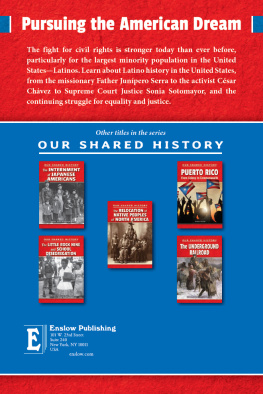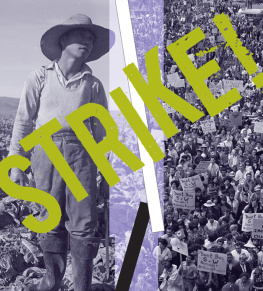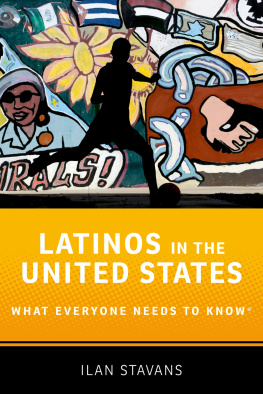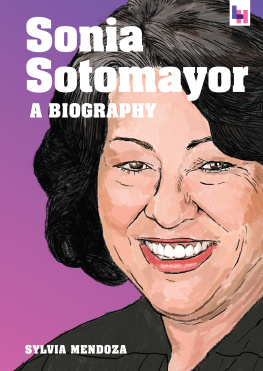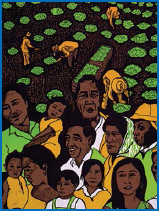Published in 2016 by Enslow Publishing, LLC
101 W. 23rd Street, Suite 240, New York, NY 10011
Copyright 2016 by Brbara C. Cruz
All rights reserved.
No part of this book may be reproduced by any means without the written permission of the publisher.
Cataloging-in-Publication Data
Cruz, Brbara C.
The fight for Latino civil rights / by Brbara C. Cruz.
p. cm. (Our shared history)
Includes bibliographical references and index.
ISBN 978-0-7660-7006-6 (library binding)
1. Hispanic Americans Civil rights History Juvenile literature. 2. Immigrants -Civil rights United States History Juvenile literature. 3. Civil rights movements United States History Juvenile literature.
I. Cruz, Brbara. II. Title.
E184.S75 C78 2016
323.119468073d23
Printed in the United States of America
To Our Readers: We have done our best to make sure all Web site addresses in this book were active and appropriate when we went to press. However, the author and the publisher have no control over and assume no liability for the material available on those Web sites or any Web sites they may link to. Any comments or suggestions can be sent by e-mail to .
Portions of this book originally appeared in the book Triumphs and Struggles for Latino Civil Rights.
Photo Credits: 2015 Florida State Hispanic Chamber of Commerce, p..
Cover Credits: David McNew/Getty Images News/Getty Images (immigrant rights activists); ilolab/Shutterstock. com (textured background).
CONTENTS
Chapter 1 The Struggle for Rights
Chapter 2 Latino Americans
Chapter 3 History of Latinos in the United States
Chapter 4 Legal and Civil Rights
Chapter 5 Latinos and Schooling
Chapter 6 Latino Immigration
Chapter 7 Latino Workers
Chapter 8 Latinos in Contemporary Society
Timeline
Chapter Notes
Glossary
Further Reading
Index
Csar Chvez was a labor leader and activist who fought for the rights of Latino American workers.
Chapter
The Struggle for Rights
Across California, across the entire nation, wherever there are injustices against men and women and children who work in the fieldsthere you will see our flagsOur movement is spreading like flames across a dry plain.
Csar Chvez
The pilgrims made their way on their long journey. Despite their pain and fatigue, they tried to stay focused on their goal: to improve conditions for migrant farm workers. The march through California had been organized by Csar Chvez, the National Farm Workers Association (NFWA), and the Agricultural Workers Organizing Committee (AWOC). In the winter of 1966 they had planned the 340-mile march from Delano, where Chvez lived, to Sacramento, the capital of California. Chvez had planned the march to begin on March 17 and end on Easter Sunday. Because it would be during the Lenten season, Chvez called it a peregrinacin, or pilgrimage. A pilgrimage is a long journey usually taken for a moral or spiritual purpose. Lent refers to the forty-day period before Easter in Christianity. It is a holy time marked by fasting and personal sacrifice.
Chvez knew firsthand how hard life could be as a migrant farm worker. His own family had lost their farm in Arizona during the Great Depression, and they had been forced to look for work as migrant farmers. Now, in 1966, most farm workers lived in the cramped quarters of labor camps, often ten or more people in a trailer home. Usually their housing had no bathrooms, no electricity, and no running water.
In 1965 Chvez had joined a strike and boycott of table grapes initiated by the Filipino grape workers who were members of the AWOC. A year later, the farm owners still had not made enough changes to improve the workers dismal conditions. Chvez knew something dramatic needed to be done to call attention to the farm workers struggle.
After just the first day of the march in 1966, painful blisters covered the marchers feet. One marcher said, Some people had bloody feet. Some would keep on walking and youd see blood coming out of their shoes. One of Chvezs legs swelled, and he developed a high fever. Despite the severe pain and the fever, Chvez refused medication and continued on the march, using a cane to help him walk.
Each night when the marchers stopped, they held a meeting to rally support and to educate the public. Hundreds of families hosted the marchers in each town, offering them a meal, a shower, and a bed to rest in preparation for the next days walk.
Csar Chvez
Csar Chvez was born on March 31, 1927, near Yuma, Arizona. Although the Chvez family was far from rich, they led a comfortable life with everyone in the family helping in the family businessa combination grocery store, garage, and pool hall.
Then in 1929 the Great Depression changed the familys life forever. Just like millions of other Americans who lost their jobs and homes, the Chvez family was forced to sell their business. Like thousands of others, the family left their home and moved to California in search of jobs.
Csars family became migrant farm workers. As his parents followed the harvest of different fruits and vegetables, Csar and his siblings helped pick crops and went to school when they could. Csar and his family sometimes lived in migrant worker camps. Other times, they had no choice but to camp out under bridges and in shacks made out of cardboard and tar paper.
These painful memories would serve Chvez well. Knowing from firsthand experience how hard life could be as a farm laborer, Chvez went on to create the UFW shortly after his famous march in 1966. Today the UFW continues its work to protect and represent farm workers throughout the United States.
Csar Chvez walks in the 1966 march that he organized in order to get the word out about the farm workers strike.
As the procession worked its way through the small towns, hundreds of people greeted the marchers and sometimes joined them, helping them carry their flags to the next town. The march eventually took twenty-five grueling days.
When the march ended on Easter Sunday as planned, about ten thousand people joined Chvez and the marchers on the steps of the capitol. Dr. Martin Luther King Jr. sent Chvez a telegram. In it, Dr. King sent his best wishes to Chvez and the United Farm Workers (UFW): Our separate struggles are really onea struggle for freedom, for dignity, and for humanity... We are together with you in spirit and in determination that our dreams for a better tomorrow will be realized. Like African Americans, Hispanic Americans have had to work hard to ensure that their rights are respected and protected.
Chvez and his associates later established the UFW. They worked tirelessly to improve the lives of agricultural workers, bringing awareness of their terrible conditions to the American public. They started a boycott of table grapes, an industry that did not treat workers well. Those Americans who supported the UFW responded by not buying table grapes. By 1969 almost three quarters of the California grape growers were out of business. By the spring of 1970, an agreement between the remaining growers and the union was finally signed. No one could believe that ordinary citizens had triumphed over the rich and powerful growers. Chvez was especially pleased when, in 1975, California passed the Agricultural Labor Relations Act, which recognized the rights of farm workers to organize and bargain collectively.

